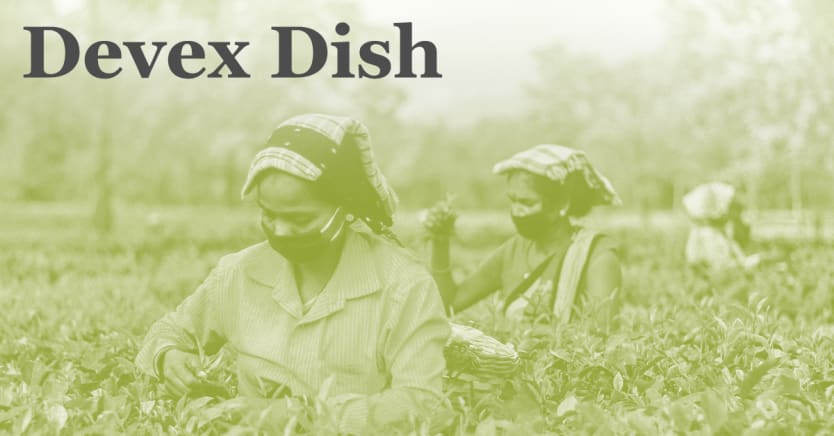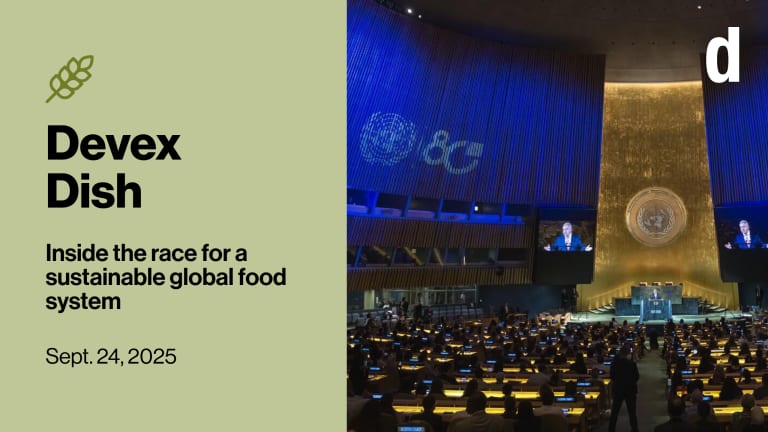
The World Food Programme is used to overcoming enormous challenges to get food to people in some of the hardest-to-reach places in the world. But one location that is posing difficulties it’s not encountered before? Eastern Europe.
This week I talked to Alex Marianelli, WFP’s director of supply chain, to get the inside view on how the agency is responding in Ukraine and surrounding countries. Having a well-functioning supply chain, complete with adequate roads, trucks, and warehouses, as well as hotels and office space, is “luxurious,” he told me — even as WFP is faced with launching entirely new operations in multiple countries at the same time.
This is a preview of Devex Dish
Sign up to this newsletter to get the inside track on how agriculture, nutrition, sustainability, and more are intersecting to remake the global food system in this weekly newsletter.
Less luxurious is the morass of customs and border regulations that the agency must comply with as supplies are sent from across the continent into neighboring countries that still very much require laws to be followed.
“Clearing armored vehicles, body armor, food — all of those things one needs to implement a humanitarian operation in a conflict. These are very well articulated rules,” Marianelli told me. “They can’t break their laws.”
Some of the supplies WFP is importing have been diverted from other crises, with the vastness and flexibility of its supply chain allowing it to adapt quickly. (Any goods that are sent somewhere other than their original location are backfilled and replaced.)
Meanwhile, at this week’s first European Humanitarian Forum in Brussels, my colleague Vince Chadwick reports on WFP head David Beasley’s warning about the coming food crisis, who says, “You will have destabilization of many nations in about six to nine months from now if we don’t get ahead of it.”
‘It is what we do’: WFP details Ukraine scale-up, challenges
Won’t stop
Of course, WFP isn’t the only U.N. agency concerned about the food price spike and looming hunger crisis. The International Fund for Agricultural Development is warning that the Middle East and North Africa regions are already seeing shortages and price hikes amid the Ukraine conflict. There is concern that these will spread to even more of the world’s most vulnerable countries, such as those in the Horn of Africa.
Small-scale producers — who are the most vulnerable to additional shocks — are already “reeling” from a host of natural disasters and the continued effects of the pandemic, IFAD says. Incomes are likely to go down as input cost rises, food supplies are reduced, and markets are disrupted.
As we saw last week in my colleague Sara Jerving’s story out of Somalia, that is only one example of a place that can little afford additional shocks. This week, she brings us news that the country has already seen prices of wheat and oil go up by 300%.
Horn of Africa: Ukraine crisis expected to deepen drought devastation
ICYMI: Livestock dies in droves in Somalia — without rains ‘humans are next’
Bank on it
Bringing home the bacon: Your next job?
Consultant: Right to Food and Food Sovereignty Act
World Food Programme
Nepal
The European Food Banks Federation, or FEBA, is a coalition of over 300 food banks in more than two dozen countries across the continent. Now, the network is mobilizing to assist Ukrainians both inside and outside the country who need meals. FEBA has established temporary hubs at food banks in Romania and Poland, while also sending supplies to a new Moldovan partner for transport into Ukraine via Odessa. So far, food deliveries into the western part of the country have operated without security issues, FEBA Secretary-General Angela Frigo tells me.
“At the moment, the system works. We don’t know what will happen, since Russia has started to attack also western cities,” Frigo says.
Read: European food banks mobilize to provide aid to Ukrainians
Number munching
$1.3 trillion
—That’s the annual investment needed over the next three decades to adapt food systems to climate change, according to a new report issued by think tank Clim-Eat along with the Alliance of Bioversity International and the International Center for Tropical Agriculture. The organizations argue that the benefit of this investment “far outweighs the cost of inaction,” estimating that the hidden environmental, social, and economic costs of our current food system amount to $20 trillion a year.
+ Pro subscribers can catch up on last week’s read: Can true cost accounting lead to sustainable food systems? Not yet a Pro subscriber? Sign up now and start your 15-day free trial.
Food fortification
USAID has issued a notice of funding opportunities for a worldwide program known as Advancing Food Fortification Opportunities to Reinforce Diets, or AFFORD. These include a $20 million award for supporting efforts to "safely and sustainably reduce micronutrient inadequacies and improve diets, particularly for women and children."
+ To keep track of this and other funding activities in food and agriculture, try out a Devex Pro Funding membership with a five-day trial or request a demo for your team.
A mouthful
“It feels wrong to spend freely on something so ephemeral as a fancy dinner while others languish in hunger, but is it?”
— Ligaya Mishan, columnist, T MagazineWe’re about to get philosophical over here at Devex Dish: The headline for this T Magazine article — “In a Starving World, Is Eating Well Unethical?” — caught my eye. Although (spoiler alert) it doesn’t definitively solve this moral conundrum, I highly recommend giving it a read — and then sharing your thoughts about it with me!
There’s so much bad news for hunger and nutrition right now, and I often wonder what I should take from that back to my own life and the food I choose to buy, prepare, and eat — or pay others to do for me when I dine out. I love writing about food, but I also love eating it. What do I owe others when I make these choices?
In the article, columnist Ligaya Mishan also gets at what the food systems nerds among us know as true cost accounting: “The perhaps undesirable truth is that food should be expensive, or at least more expensive than it is, given the toll agriculture takes on the environment and the labor required for planting and harvesting.”
Do you think about this, too? I’d love to hear what you have to say: Write me at dish@devex.com.
Chew on this
A new strategy is not only effective at treating children with acute malnutrition, but it also costs less than standard programs, according to a new study. [The Lancet Global Health]
A group of New Yorkers is fighting to implement a universal composting program in the city. [Outside]









